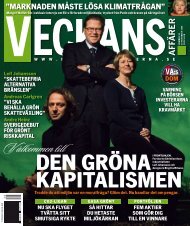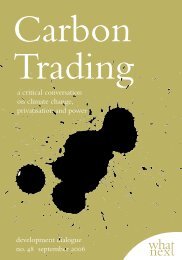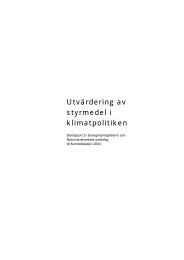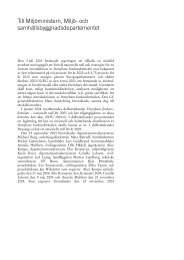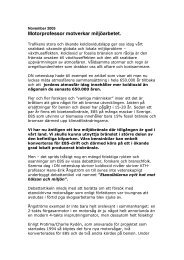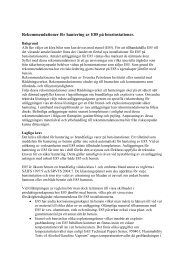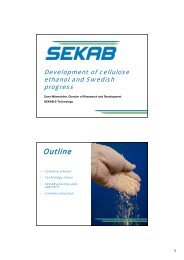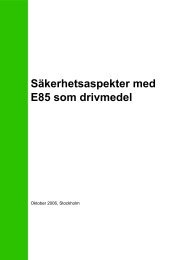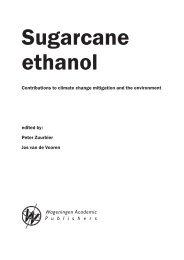Production and use of fuel ethanol in Brazil - BAFF
Production and use of fuel ethanol in Brazil - BAFF
Production and use of fuel ethanol in Brazil - BAFF
Create successful ePaper yourself
Turn your PDF publications into a flip-book with our unique Google optimized e-Paper software.
26<br />
The term <strong>of</strong> transactions, f<strong>in</strong>ancial charges, guarantees, f<strong>in</strong>ancial agents <strong>and</strong> other<br />
f<strong>in</strong>ancial conditions <strong>of</strong> the program are determ<strong>in</strong>ed by the National Currency Board.<br />
The specific legislation <strong>in</strong> force does not provide for any public source <strong>of</strong> f<strong>in</strong>anc<strong>in</strong>g<br />
for any such measure as may be aimed at support<strong>in</strong>g or subsidiz<strong>in</strong>g the production<br />
<strong>of</strong> sugar-cane for <strong>use</strong> as raw material for sugar, or even the sugar production itself.<br />
The <strong>Brazil</strong>ian sugar-cane, sugar <strong>and</strong> <strong>ethanol</strong> regime is perfectly compatible with the<br />
World Trade Organization Agreements. However, baseless allegations can still be<br />
heard aga<strong>in</strong>st our regime. The most relevant ones are commented on below:<br />
a) The m<strong>and</strong>atory <strong>fuel</strong> blend<br />
Anhydrous <strong>ethanol</strong> is known to be added to the base gasol<strong>in</strong>e <strong>in</strong> <strong>Brazil</strong> as a<br />
requirement <strong>of</strong> the environmental legislation. The theme has be the subject <strong>of</strong><br />
accusations on the part <strong>of</strong> those who are not familiar with the WTO rules. Some<br />
say that beca<strong>use</strong> the blend is m<strong>and</strong>atory, domestic producers are assured a market,<br />
which is an illegal practice.<br />
The production <strong>and</strong> <strong>use</strong> <strong>of</strong> <strong>ethanol</strong> as a <strong>fuel</strong> <strong>and</strong> partial substitute for gasol<strong>in</strong>e <strong>in</strong><br />
<strong>Brazil</strong> contributes to reduc<strong>in</strong>g the harmful effects <strong>of</strong> environmental pollution.<br />
<strong>Brazil</strong>’s environmental legislation sets the st<strong>and</strong>ards on vehicle emission limits <strong>and</strong><br />
the oxygenate levels required for the gasol<strong>in</strong>e that is sold <strong>in</strong> the domestic market 9 .<br />
On the other h<strong>and</strong>, technical knowledge confirms that the possible substitutes<br />
for anhydrous <strong>ethanol</strong> lack the features that make <strong>ethanol</strong> an environmentally<br />
susta<strong>in</strong>able <strong>fuel</strong>. MTBE, an additive broadly <strong>use</strong>d <strong>in</strong> US gasol<strong>in</strong>e <strong>in</strong> the 1990’s, is now<br />
be<strong>in</strong>g banned from the US market beca<strong>use</strong> <strong>of</strong> water <strong>and</strong> soil contam<strong>in</strong>ation. ETBE,<br />
an additive <strong>in</strong> <strong>use</strong> <strong>in</strong> some countries, especially <strong>in</strong> Europe, shows a much lower<br />
greenho<strong>use</strong> gas reduction potential than that <strong>of</strong> <strong>ethanol</strong> beca<strong>use</strong> its formulation is<br />
ma<strong>in</strong>ly based on isobutylene, an oil byproduct. Furthermore, <strong>in</strong> order to achieve<br />
the same oxygenation level as <strong>ethanol</strong> more than twice as much ETBE needs to be<br />
<strong>use</strong>d, <strong>and</strong> that has considerable economic impacts. MMT, another gasol<strong>in</strong>e additive<br />
that <strong>in</strong>creases octane rat<strong>in</strong>g, is a manganese-based chemical that has also been <strong>in</strong><br />
<strong>use</strong> <strong>in</strong> some countries; however, the <strong>use</strong> <strong>of</strong> this additive has been associated with<br />
a loss <strong>of</strong> efficiency <strong>of</strong> catalytic converters <strong>in</strong> controll<strong>in</strong>g gas pollutant emissions. In<br />
other words, <strong>ethanol</strong> is the onlycommercially available dditive known to achieve the<br />
environmental protection <strong>and</strong> economic feasibility goals.<br />
Accord<strong>in</strong>g to WTO rules, member countries must ensure that their technical<br />
regulations are not prepared or enforced for the purpose <strong>of</strong> creat<strong>in</strong>g unnecessary<br />
barriers to <strong>in</strong>ternational trade. Technical regulations must not be more restrictive<br />
8 Law no. 8,723/93 <strong>of</strong> October 28, 1993.<br />
A. Fuel <strong>ethanol</strong>: Activities <strong>in</strong> <strong>Brazil</strong> <strong>and</strong> the world context



